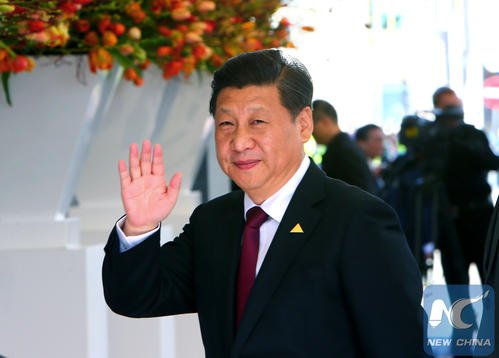Is Winnie the Pooh illegal in China? Well, that depends on what you mean by “illegal.” It also depends on what you mean by “in China.” Or what you mean by “pooh.”
The story goes that Chinese President Xi got upset at comparisons made between himself and a certain lovable, yellow bear. Soon, Winnie the Pooh became a symbol of resistance against government repression. The government scrubbed all references to Pooh from China and even banned the new Christopher Robin movie. Western media ranging from South Park to more reputable news agencies have repeated the sad tale of authoritarian paranoia so much it’s become common knowledge.
Except it isn’t exactly true.
Winnie the Pooh Lives

I definitely believed that Winnie the Pooh was illegal in China before I came here. As much as I liked the character as a child, I accepted that was just going to be part of life in China. I was quite surprised to walk into a shop and see Pooh’s fat yellow bear face staring back at me.
In fact, Winnie the Pooh is all over the place in China. People wear him on t-shirts, stores sell Winnie the Pooh dolls. He’s on wall clocks and overpriced fleece blankets.
Granted, the bear isn’t as popular as other cartoon characters. Peppa Pig (who I’d also falsly believed had been censored in China) is far more popular. Especially since 2019 was the year of the pig.
But, neither Peppa nor Pooh can hold a candle to Pikachu though. The Chinese absolutely love Pikachu. I’ve seen sports cars and motorcycles with Pikachu airbrushed on the side. One of my students’ fathers even has a Pikachu tattoo on his leg.

But, I digress.
The point is, Winnie the Pooh is not illegal in China. Far from it. He’s marketed here just as much as he is in the U.S. Rather than a symbol of resistance, Winnie the Pooh is more of a symbol of China’s embrace of capitalism.
Is Winnie the Pooh Illegal in China’s Internet?
“What about on the internet?” you may be asking. That’s a good question. It’s definitely possible that the willy, nilly, silly old bear might be abundant in real life, but absent online.
So, I did some research. By “research” I mean I went to baidu.com (Chinese Google) and typed in “winnie the pooh” into the search bar. Boom. There he is.

I even found a link to the notorious Christopher Robin movie. It’s available to watch in China, without any VPNs or workarounds.

In order to prop up the domestic film industry, China only allows a certain number of foreign films to be released in theaters each year. The Christopher Robin movie, unfortunately for a chubby little cubby all stuffed with fluff, just didn’t make the cut for wide release that year. If you read all the way to the end of the articles about China banning Winnie the Pooh, they often write a sentence or two about this as a possibility. But, it’s here. When travel reopens you can come to China and watch Ewen McGregor as an adult Christopher Robin all you want.
So, there you go. Winnie the Pooh is not illegal in China. He’s alive and well, and embraced along with a whole bunch of other Disney characters as China opens itself to the West. Unfortunately, Eeyore, the clinically depressed donkey, hasn’t quite caught on.
The Reality of Chinese Censorship
Just because Chinese people can buy a stuffed Winnie the Pooh doll in China or a t-shirt or whatever doesn’t mean that there aren’t issues with censorship here. There are. Big ones.
The internet, for example. It is actually true that you can’t access Wikipedia and the New York Times here. Or YouTube, Instagram or Facebook.

Those restrictions are easily worked around with a VPN. (A VPN tricks the internet into thinking you’re located in a different place than you are.) It’s not difficult to set up, but it does sometimes make things move very sssssllllllooooooowwwwlllyyyy. It’s also an annoying extra step when all you want to do is look at videos of cats jumping on kids or see what your friends back home ate for lunch yesterday.
There are far worse things than just not being able to scroll through your Instagram feed. Let’s not even touch freedom of the press, and just stick to anecdotes.
A friend told me a story of someone they knew who posted things critical of the government on WeChat (Chinese Facebook, basically). The next day the police knocked on their door and dragged them down to the station for questioning.
As an American, I can say something like “President Donald Trump is a piece of human garbage who is ruining the country and deserves to burn in hell.” I can post that sentence on a public blog, and not fear any repercussions.
In fact, I didn’t even try to research whether it’s possible to do a Baidu search for comparisons between a certain resident of the 100 Acre Wood and a certain leader of a certain populous Asian nation. It’s probably fine, but you never know. Update: I actually did search for “Winnie the Pooh and China” in Baidu. I got a blank page saying “No results found”. Yeah.
Everyday Censorship
On a day to day basis, however, China’s censorship is pretty invisible. Aside from when you want to check Facebook, of course. I really don’t think the government bats much of an eye at foreigners, unless you’re trying to rabble rouse. If you want to hear a lot of loud complaints about China’s government, go to an expat bar in Shanghai on a Saturday night.

Even among Chinese people though, there doesn’t seem to be that much thought or fear of the government in day to day life. People grumble about the government here almost as much as they do anywhere else. Sometimes it seems as though bypassing all the many rules and regulations is a national sport.
Though, based on my limited observations, I’d say 2020 has really boosted the image of the government in most Chinese people’s minds. People here read the news about the surge of Coronavirus cases, gun violence, social unrest, and the volatile economy in America. Sure, China may have its flaws, but at least it’s not as chaotic as the U.S. They may grumble about the regulations and internet censorship, but they accept it as a small price to pay for safety and social stability.
So, Winnie the Pooh is not illegal in China. Direct comparisons between the President and the Bear are. But, you can still wear a Winnie the Pooh shirt or watch that crappy Christopher Robin movie all you want. The reality of Chinese censorship is stickier than the inside of a honey jar.

Need Train Tickets in China?
China’s high speed rail network is fast and efficient, but it’s difficult for non-Chinese citizens to get tickets. Fortunately, Trip.com makes buying train tickets as hassle free as traveling through China can possibly be. Click the link below to get your Chinese train tickets. If you buy your train tickets using the link, I’ll receive a small commission and you’ll feel good knowing you’ve helped out an independent blogger.
